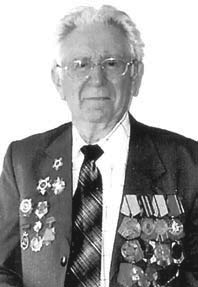
Born on April 25, 1923 in Kiev, Ukraine.
Served in the army from 1941 until May 1947.
Pinskiy fought as part of Command #7 guarding the northern shores of the Azov Sea (Southern Front), in the 268th Army cannon regiment of the High Command Reserves (he participated in the defense of the Caucasus – breakthrough of the German “blue line” to the Kuban, the liberation of Slavyansk, Golubitskaya, Kurchansk, and others, and the town of Temruk), in the 268th Red Banner regiment of the special Primorsk Army, he took part in the Kerch amphibious operation in the northeast of Kerch (the liberation of Kerch, Feodosiya, Sudak, Alushta, Simferopol, Bakhchisarai, and Balaklav), in the assault on the Sapun-Gor enforcement and the liberation of Sevastopol. He fought in the 151st twice Red Banner army cannon brigade of the 1st Byelorussian Front (the breakthrough to the Baltic Sea and the cutting off of the Kurlyandsk German group).
He was awarded an order of the second degree of the Patriotic War and medals “For Valor”, “For the defense of the Caucasus”, and “For Victory over Germany”.
Served in the army from 1941 until May 1947.
Pinskiy fought as part of Command #7 guarding the northern shores of the Azov Sea (Southern Front), in the 268th Army cannon regiment of the High Command Reserves (he participated in the defense of the Caucasus – breakthrough of the German “blue line” to the Kuban, the liberation of Slavyansk, Golubitskaya, Kurchansk, and others, and the town of Temruk), in the 268th Red Banner regiment of the special Primorsk Army, he took part in the Kerch amphibious operation in the northeast of Kerch (the liberation of Kerch, Feodosiya, Sudak, Alushta, Simferopol, Bakhchisarai, and Balaklav), in the assault on the Sapun-Gor enforcement and the liberation of Sevastopol. He fought in the 151st twice Red Banner army cannon brigade of the 1st Byelorussian Front (the breakthrough to the Baltic Sea and the cutting off of the Kurlyandsk German group).
He was awarded an order of the second degree of the Patriotic War and medals “For Valor”, “For the defense of the Caucasus”, and “For Victory over Germany”.
YULIY
PINSKIY
ЮЛИЙ
ЛЕЙБОВИЧ
ПИНСКИЙ
Родился 25 апреля 1923 г. в г. Киев, Украина.
В армии с 1941 г. по май 1947 г.
Воевал в составе команды №7 по охране северного побережья Азовского моря (Южный фронт); в 268-м армейском пушечном артполку Резерва Главного Командования (участвовал в обороне Кавказа – прорыв немецкой «Голубой линии» на Кубани, освобождение ст. Славянская, Голубицкая, Курчанская и др., г. Темрюк); в составе 268-го Краснознаменного артполка отдельной Приморской армии участвовал в Керченской морской десантной операции северо-восточнее Керчи (освобождение Керчи, Феодосии, Судака, Алушты, Симферополя, Бахчисарая, Балаклавы), в штурме укреплений на Сапун-Горе и освобождении Севастополя; сражался в составе 151-й Мелитопольской дважды Краснознаменной армейской пушечной артбригады 1-го Белорусского фронта (прорыв к Балтийскому морю, отсечение Курляндской группировки немцев).
Награжден орденом Отечественной войны II степени; медалями «За отвагу», «За оборону Кавказа», «За победу над Германией».
В армии с 1941 г. по май 1947 г.
Воевал в составе команды №7 по охране северного побережья Азовского моря (Южный фронт); в 268-м армейском пушечном артполку Резерва Главного Командования (участвовал в обороне Кавказа – прорыв немецкой «Голубой линии» на Кубани, освобождение ст. Славянская, Голубицкая, Курчанская и др., г. Темрюк); в составе 268-го Краснознаменного артполка отдельной Приморской армии участвовал в Керченской морской десантной операции северо-восточнее Керчи (освобождение Керчи, Феодосии, Судака, Алушты, Симферополя, Бахчисарая, Балаклавы), в штурме укреплений на Сапун-Горе и освобождении Севастополя; сражался в составе 151-й Мелитопольской дважды Краснознаменной армейской пушечной артбригады 1-го Белорусского фронта (прорыв к Балтийскому морю, отсечение Курляндской группировки немцев).
Награжден орденом Отечественной войны II степени; медалями «За отвагу», «За оборону Кавказа», «За победу над Германией».